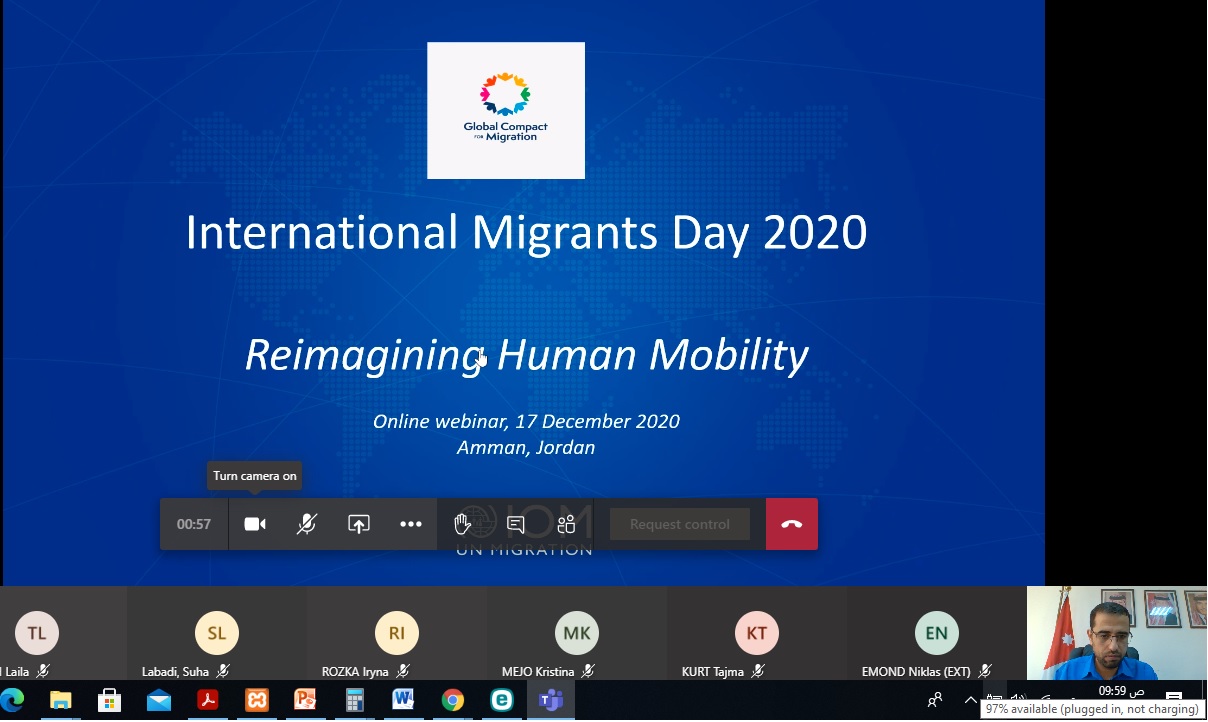
|
The Center of Refugees, Displaced Persons and Forced Migration studies, in cooperation with the International Organization for Migration in Jordan, participated in a seminar through visual communication technology on the occasion of the International Day of Migrants, which falls on the eighteenth of December of each year under the slogan (We are together, we learn together, create together and work together And we play together). The symposium aimed to bring together the various state and local institutions and decision-makers to exchange views, with the Global Compact for Migration as a general topic, and the discussion reflected the impact of the Corona pandemic, specifically the social and economic situation of refugee, displaced and migrant workers in Jordan, as well as the potential effects of the current crisis on human mobility in whom A medium to long-term perspective, how to meet the challenges posed by the epidemic, and means of cooperation between the host countries and the international community. The center’s participation was represented by presenting the most important economic impacts resulting from the Coronavirus pandemic on migrants and displaced persons in Jordan, and how they are affected, like other countries of the world, by limited job opportunities and the loss of some of their work. A migrant is defined as any person who moves or moved across international borders or within a country far from his usual place of residence, regardless of the person’s legal status, whether the movement is voluntary or involuntary, what are the reasons for the movement, or what is the length of stay, and some people move in search of Others move to escape from conflict, persecution, terrorism or human rights violations, while others move in response to the negative impacts of climate change, natural disasters, or other environmental factors. The migration factor is the third element of population growth, in addition to births and deaths, as the figures issued by the Higher Population Council indicate that studies indicate that about 57 nationalities are present in Jordan, and among the most numerous of these nationalities are Syrians, whose number reached one million and 265,514 thousand, and Iraqis. 130911 thousand, the Palestinians 634182 thousand, and the Egyptians 636270 thousand, and the percentage of immigrants in Jordan is about 31%. The High Commissioner for Refugees has classified Jordan as the second highest country in the world by the number of refugees. In addition, 55% of the non-Jordanian population came to Jordan due to insecurity in their country of origin, 18% due to work, 2% for studies, and 85% of the non-Jordanian population are refugees, and their presence in the capital, Amman, is 33% more. Then Irbid 24%, and by 17% in Zarqa Governorate and 15% in Mafraq respectively, and according to the General Population and Housing Census 2015, 17% of refugee families are headed by a woman, and the illiteracy rate among refugees is about 13.6%, in addition to 47, 9% of the refugees are dependent individuals, pointing out that according to the Ministry of Labor data, the number of those who obtained work permits for the year 2019 reached (348 736 thousand), of whom (91 9887 thousand) were females, and the total number of domestic workers reached (55,551 thousand). |


